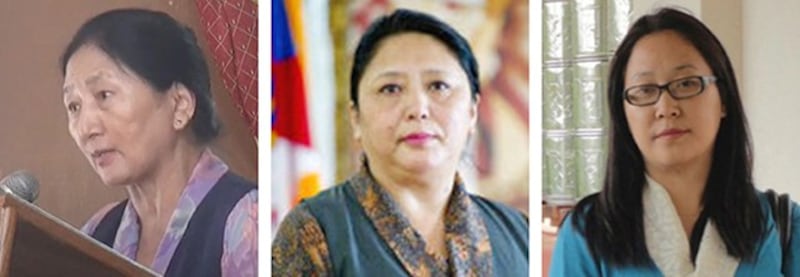Tibet’s exile parliament in an historic move on Monday voted three women into positions in the Kashag, or cabinet, of the Dharamsala, India-based exile government, the Central Tibetan Administration.
The vote in the 17th parliament’s first session followed an impasse over the seating of 45 new parliamentarians elected in an April 11 vote held in Tibetan communities worldwide.
Controversy over the validity of the oaths of office taken by two separate groups had stalled the legislature’s business for four months, and was ended only following the intervention of exiled Tibetan spiritual leader the Dalai Lama.
Presiding over Monday’s meeting, Penpa Tsering—now Sikyong, or political leader, of the exile government—proposed six nominations for the post of Kalon, or cabinet minister, and three women were quickly voted in.
Gyari Dolma, a former minister and deputy speaker of the House; Tharlam Dolma, a former school principal; and Norzin Dolma, a former researcher at the Dharamsala-based Tibetan Centre for Human Rights and Democracy, will now serve in the CTA cabinet, each with responsibility for one of the government’s departments.
The new Kalons’ specific assignments will be made at a later date.

After 19 members staged a walkout Monday over the nomination of one MP, Ngodup Dorjee, over questions of incompetence, Tsering in a meeting next day withdrew his other nominations, moving discussion of their candidacy to a later date.
“In order to uphold the importance of this first session, I will withdraw the remaining nominations until the next session,” Tsering said. “And I therefore request the members of parliament to respect the proceedings of the House next time.”
The Tibetan parliament in exile meets twice a year, once in March to discuss the CTA budget and once in September to discuss reports from each of the government’s departments.
Formerly an independent nation, Tibet was invaded and incorporated into China by force 70 years ago, following which the Dalai Lama and thousands of his followers fled into exile in India and other countries around the world.
Chinese authorities maintain a tight grip on the Tibetan region, restricting Tibetans’ political activities and peaceful expression of cultural and religious identity, and subjecting Tibetans to persecution, torture, imprisonment, and extrajudicial killings.
The Tibetan diaspora is estimated to include about 150,000 people living in 40 countries, mainly India, Nepal, North America, and in Europe.
Reported by Lobsang Gelek for RFA’s Tibetan Service. Translated by Tenzin Dickyi. Written in English by Richard Finney.
